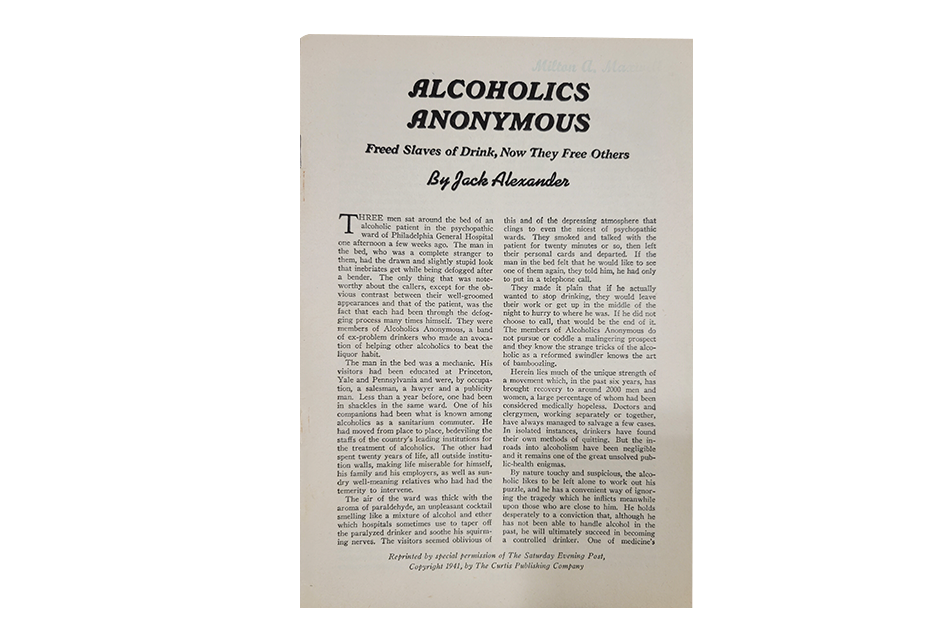On March 1, 1941, The Saturday Evening Post published “Alcoholics Anonymous: Freed Slaves of Drink, Now They Free Others." The article became a major turning point in the history of Alcoholics Anonymous.
The Journalist Meets Bill W.
The story begins when the owner of The Saturday Evening Post, Judge Curtis Bok, learned of A.A. from two friends. He wanted the Post tell the story of the organization. He called upon a well-known journalist of The Saturday Evening Post, Jack Alexander, to do so.
A.A. co-founder Bill W., eager to publicize the A.A. message, met with Alexander. He gave Alexander access to records and a tour of significant A.A. sights. He also set up interviews both with A.A. members and with nonalcoholic trustees of the General Service Board.
Correspondence between Jack Alexander and Bill W. shows the excitement about the upcoming article. On January 4, 1941, Alexander wrote to Bill W. and enclosed a manuscript of the article for Bill to read. On January 6, Bill replied, and from his response the eagerness for the article’s release is clear. Bill wrote:

Response to the Article
On March 1, 1941, The Saturday Evening Post published the article titled “Alcoholics Anonymous: Freed Slaves of Drink, Now They Free Others."
Following the release of the article, inquiries began to flood in. The small staff of the “A.A. Headquarters,” the precursor to the General Service Office, was busy. On March 12, Ruth Hock, first nonalcoholic secretary of A.A., wrote to Dr. Bob, A.A. co-founder, to update him on events in New York. She said that the office had become swamped with 918 inquiries in 12 days as a direct response to the article.
The offices of The Saturday Evening Post also received a large number of inquiries. A March 26, 1941, bulletin by the Post relays the power behind the article.
The Follow-Up Article in 1950
Eight years after the wildly successful 1941 Saturday Evening Post article, Bill W. wrote to Jack Alexander with a request. Bill W. hoped Alexander would write a follow-up article. On June 8, 1949, Bill W. wrote the following:
Nowadays A.A. rarely asks for publicity. I suppose we still get it in enormous quantities partly for that reason. Yet the time is here when an exception should be made.
The point of this letter is what I would definitely like to ask you folks a favor. Will you print another piece about us?
The general public has only the vaguest idea what our society really looks like. I think they would be interested in an inside view.
From our standpoint, a vital job has to be done. Now that the recovery formula is above ground and working at a prodigious rate, our main problem is that of maintaining our unity as a movement until every drunk in the world has had a good look at the idea.
So then, if John Q. Public could get an inside view of what our fellowship is really like, and it could become quite clear to him what good A.A.’s do and what they don’t do in their relationships with each other and with the outside world, the Saturday Evening Post would have written an insurance policy on our future, the value of which no men could ever reckon.”
On June 9, Jack Alexander replied that he had always thought about writing a follow-up but had never gotten around to it. He also writes that there is trouble with the idea and says:
On December 13, 1949 Bill W. wrote to Jack Alexander outlining the major turning points in the A.A. movement. This included the decision to leave the Oxford Group and Rockefeller affirming that their work should be self-supporting. He also mentioned the formation of the Alcoholic Foundation and the first two chapters of the Big Book.
For the next few months Bill W. and Jack Alexander corresponded regarding corrections to the article. Finally, eight months after Bill W. proposed the idea to Alexander for a follow-up, the article was released. “The Drunkard’s Best Friend” was published in the April 1, 1950 issue of The Saturday Evening Post.
“The Drunkard’s Best Friend” was a success, just as its predecessor was. On April 22, 1950, Bill W. wrote to Ben Bibbs, editor of The Saturday Evening Post. He praised Jack Alexander and the two articles. Bill wrote:
We of Alcoholics Anonymous wish to tell how immensely grateful every man-jack of us is for this happy circumstance. It is not the least exaggeration to say that Jack’s ‘Alcoholics Anonymous’ article of nine years ago brought recovery within the reach of 10,000 alcoholics and great happiness to as many homes. Since the public impression of this last piece of Jack’s is tops, we make no doubt that it will accomplish a fine result.
We know that the whole world will one day agree that these two articles of Jack’s about A.A. are to be regarded the greatest public service the Saturday Evening Post has ever done. And that’s saying a great deal, indeed.”
Jack Alexander’s Articles Still Appreciated
Jack Alexander passed away in 1975. In his West Texas Register obituary, he was credited as the newspaperman who made “Alcoholics Anonymous a major organization by the articles he wrote about its work.”
Today, the General Service Office Archives still receives inquiries requesting both articles. You can read the 1941 article by Jack Alexander here.